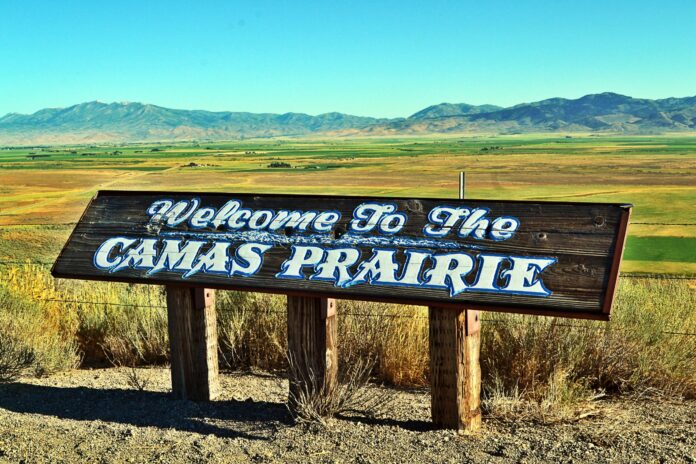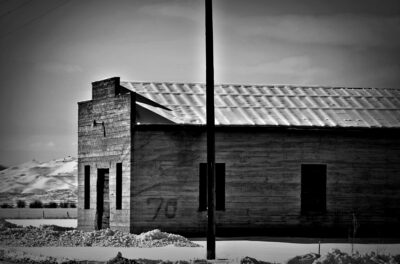
Part 1 of 3
By Karen Crowson

Editor’s Note: If history repeats itself, it’d be a good idea to take some of it in—especially the times that happened in our own backyard. In these rapidly changing time, and as we celebrate our nation’s 244th birthday, we’re excited to offer this three-part glimpse into the south Valley area known as Soldier, written by freelancer Karen Crowson. Enjoy!
Two miles north of Fairfield lies a modern-day ghost town where few structures remain of a once-thriving community known as Soldier.
Founded in 1881, Soldier was once the largest community on the Camas Prairie and looked every part of a frontier town. The Gem State Land Company advertised this area of the Camas Prairie as “the last cheap tract of land in the Northwest.” A newly discovered mining area in the Sawtooths kick-started Soldier’s inception and Soldier emerged as a small mining community.
Considered to be the father of Soldier, Jimmy Peck moved from Boise to the Camas Prairie, purchasing a plot of land in 1881. On the crossing of Old Immigrant Road and Soldier Creek, Peck homesteaded and set up a store. The following year, Peck opened the first post office of Soldier in his store in 1882.
A Time To Grow
From 1883–1884, Soldier began to grow, starting with the first school that once stood on Baseline Road, with Mrs. Charlotte Abbot as the teacher. During this time, W.Y. Perkins, a local lawyer, promoted the interests of Soldier. Peck platted the town in 1884 and a domino effect of growth occurred.
On June 24, 1884, the Wood River Times reported:
“On Camas Prairie at Soldier, the Smith Brothers are building a saloon; Alex Sifers has opened a lumber yard, Allen and Steele are erecting two houses, and James Peck is putting up a hotel. Other parties intend to build as soon as they can get lumber. The people of Camas Prairie are quite as anxious to have the Camp Creek Road opened to Hailey as the people of this city are, and on the fourth of July, they will hold a meeting at Soldier to discuss the matter and take steps to have the road built at once. The people of Shoshone are after the same trade and already have a gang of men at work on a wagon road from that place to Soldier, which will be completed in about a month. But the people around Soldier think that the distance is too great to trade there as long as they can sell their produce here.”
During this time Soldier saw the opening of J.A. White’s boarding house and Charlie Smith’s meat market. Making a stake in the Loer d’Alene mines, William Bashford fell in love with the Camas Prairie—in particular, Soldier. Bashford opened the first general merchandise store in Soldier and on June 28 the Wood River Times recorded, “Uncle Peck, who owns the town-site at Soldier, is in from Camas Prairie. He says that he is going to have a small ‘New York’ at Soldier.”
On the Fourth of July, it was recorded by the Wood River Times that over 200 people were in Soldier, celebrating:
“A.M. Funkhauser and E.B. Lemmon went out to Soldier on Camas Prairie to celebrate the Fourth. Mr. Lemmon was reader and Mr. Funkhauser was orator; a young lady played the organ. Over 200 persons were in attendance from all parts of the Prairie. Dancing began at 2 p.m. and continued until late at night and all in attendance felt that it was great to be there. Squire Abbot, Uncle Jones, Frank Peck, Alex Sifers, and others proved a very efficient committee for arrangements. Mr. Funkhauser says the dinner was the finest he ever ate.”
Small Town, Big Scandal
Even with Soldier’s growth and praise from the press, Soldier wasn’t immune to scandal, and on July 5, 1884, the Wood River Times stated:
“The Correspondent for the Wood River Times makes this report on happenings around Soldier; There has been quite a sensation here lately, the outlines of which I will give you, but suppress the names. Last fall there was a young couple who wanted to marry but the lady’s parents objected on account of the youth of both parties and everything seemed to be peaceable until recently, when the girl undertook to leave home, apparently intending to live with the young man’s people. Of course, her folks objected and finally her father whipped her—some say for writing to the young man, giving the father’s consent to the marriage and signing her father’s name to the letter; others say she took poison. Whatever the reason, she undoubtedly received a sound thrashing, as she still bears the marks on her body. As might be supposed, this only made matters worse, for outsiders sympathized with the girl and she ran away from home but alas for the inconsistency of man! That young man flatly refused to marry her. Of course, this changed the state of affairs with the ready sympathizers and they all agreed that the best place for her was at home.”
Even with scandal, Soldier kept growing, and on July 21 the Wood River Times reported on a grand ball held in Bashford’s new store at Soldier.
In April, 1886, the road from Soldier to Little Smoky was declared a public highway and this spurred the continuation of Soldier. By September, the new two-story Soldier Schoolhouse was completed on West Main Street but was condemned shortly after due to too much gravel in the cement. Still in existence today south of Main Street on Baseline Road stands Goff’s Hall, a 200-foot Opera House built the same year.
Politicking Starts Cliquing
The biggest milestone for Soldier during 1886 was the organization of the Soldier Lyceum. The Lyceum consisted of Mrs. Leander Perkins as officer, Fanny Waring as secretary and vice-president, and George H. Abbot as president. The Lyceum held weekly meetings where debates were held on state issues with as many as 70 people recorded attending. These debates affected elections and votes and, in 1886, the following votes were cast for congressional delegates Fred Dubois (Republican) and John Hailey (Democrat). Chricton voted 30 (Dubois) and 19 (Hailey), Willow Creek tied 10-10, Corral voted 13 (Dubois) and 21 (Hailey), while Soldier voted 42 for Dubois and 35 for Hailey. Dubois won the 95 votes to Hailey’s 85.
The Lyceum played a vital role in politics, even sponsoring Lewis LaVake, the editor and publisher of the Soldier Gimlet. Besides politics, the Lyceum held programs for Soldier, even providing music. Residents of Soldier participated in these musical programs, such as Mamie Carson, an organist who also played the harmonica and banjo. There was also Jennie Sprout, who was blind and usually assisted by James Sprout, where she, too, played the organ, piano, violin, and even sang. Bert Sprout also played the harmonica. With music available, there were many dances held at the Lyceum, where the women of the town brought their most special dishes they had prepared.
By 1888, a brass band was organized following meetings at the Salvation Army. The first weather stations were established on the Camas Prairie in 1894 with one operating out of Corral and the other at
Soldier.


